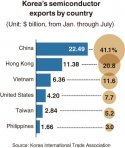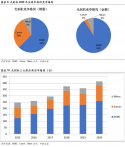Still, there are some cracks beginning to appear between some of the partners, in particular South Korea and the United States.
In an interview with the , Ahn Duk-geun, South Korea’s trade minister, said there were disagreements between Seoul and Washington over the latter’s continued export restrictions on semiconductor tools to China.
“Our semiconductor industry has a lot of concerns about what the US government is doing these days,” Ahn told the FT.
China, the world’s largest importer of chips, is a key market for chip companies globally, from U.S. giants like Qualcomm to Samsung in South Korea. With politics and business mixing, the stage could be set for more tension between nations in these high-tech alliances.
“Not all U.S. allies are eager to sign up for these alliances, or expand controls on technology bound for China, as they have major equities in both manufacturing in China and selling into the China market. Most do not want to run afoul of Beijing over these issues,” Triolo said.
Creating a chip alliance that excludes the largest chip market?



